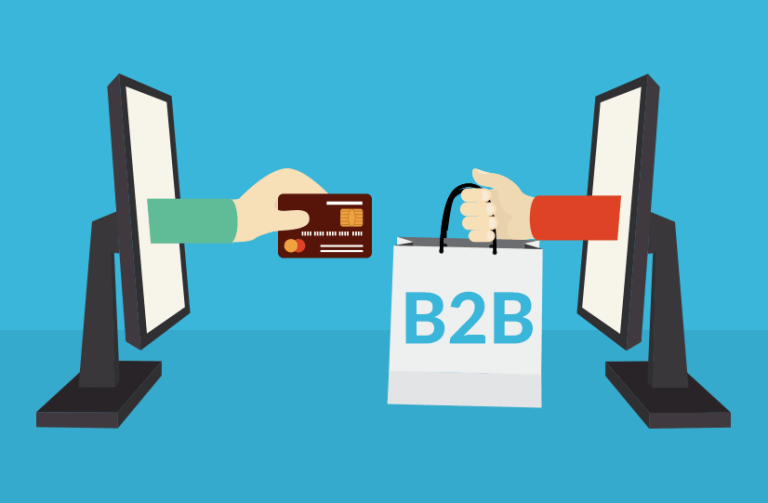13 Jan

B2B ecommerce stores are transforming the way businesses operate in the digital era. These platforms offer a specialized environment for business-to-business transactions, providing efficiency and convenience. They cater to unique business needs like bulk orders, custom pricing, and long-term contracts while ensuring security and compliance. With integrated analytics and CRM tools, these stores offer insights into customer behaviors, aiding in strategic decision-making. As digital commerce grows, a robust B2B ecommerce store becomes essential for businesses seeking a competitive edge and global market presence.
What is a B2B Ecommerce Store?
A B2B ecommerce store is a virtual store where you can sell online over the internet. Today, people prefer to stay home with the pandemic becoming a world problem. Of course, this did not happen only because of the pandemic. Over time, people started to do their work easily from home instead of leaving the house and shopping.
At this point, B2B ecommerce stores took the place of stores. In this process, Apex Loyalty helped many companies establish e-commerce sites and ensured success for companies in the virtual world. This situation has enabled small and large stores to make their work easier. People living in their homes no longer waste time. People can now sit at home and do their job without wasting time. As technology advances, this will become much more common in the future. In short, the B2B e-commerce store is the conclusion of phones, computers, and many new technological developments.
Types of B2B Ecommerce
B2B ecommerce, or business-to-business electronic commerce, encompasses various models, each catering to distinct needs and business interactions. The primary types include:
- Wholesale Transactions: This traditional form of B2B ecommerce involves bulk selling goods to other businesses, often retailers or professional buyers. Large order volumes and recurring business relationships characterize it.
- Manufacturers and Distributors: Manufacturers sell directly to distributors or other businesses. This model streamlines the supply chain, reducing costs and improving efficiency.
- Business Services: Unlike product-based transactions, this type focuses on providing services to other businesses. It includes areas like IT services, consultancy, and B2B marketing agencies.
- Online Marketplaces: Platforms like Alibaba and Amazon Business where multiple sellers can list their products or services. These marketplaces facilitate a wide range of transactions and offer diverse products.
- Software as a Service (SaaS): In this model, businesses provide software solutions on a subscription basis. It’s a growing segment in B2B ecommerce, offering solutions like CRM systems, business analytics, and enterprise resource planning.
Each type of B2B ecommerce has unique features and caters to specific market needs. Understanding these differences is crucial for businesses to choose the right model for their products or services, ensuring they effectively meet their customers’ demands and optimize their sales strategies in the digital marketplace.
Benefits of B2B Ecommerce Platforms
Embracing a B2B ecommerce platform offers many advantages that can propel business growth and efficiency. Here’s an overview:
- Expanded Market Reach: B2B ecommerce platforms break geographical barriers, allowing businesses to reach new markets and customers globally. This expansion is not just about increasing sales; it’s about diversifying the customer base and reducing dependency on local markets.
- Enhanced Customer Experience: These platforms provide a streamlined, user-friendly shopping experience. Features like personalized product recommendations, detailed product information, and easy navigation cater to the specific needs of business customers, leading to higher satisfaction and loyalty.
- Efficient Order Processing and Inventory Management: Automation of order processing reduces human error and speeds up transaction times. Real-time inventory management helps maintain optimal stock levels, avoiding overstocking or stockouts and thus improving operational efficiency.
- Data-Driven Insights: B2B platforms have analytics tools that offer valuable insights into customer behavior, market trends, and sales performance. These insights are crucial for making informed business decisions and strategizing for growth.
- Cost Reduction: These platforms can significantly lower operational costs by automating various processes and reducing the need for physical stores and sales teams. The efficiency in supply chain management also contributes to cost savings.
- Scalability: As your business grows, a B2B ecommerce platform can easily scale to accommodate increased product lines, customer bases, and transaction volumes without a proportional cost increase or complexity.
- Improved B2B Relationships: These platforms facilitate better communication and collaboration with business partners, suppliers, and customers. Features like bulk ordering, flexible payment terms, and customized pricing strengthen business relationships.
How Does the B2B Store Provide Convenience to Customers?
The B2B ecommerce store allows customers to find the product they are looking for effortlessly. In addition, customers can also compare prices without visiting the store. In this way, the customer does not have to deal with bargaining. With this life-changing B2B Loyalty Software, customers can make choices that fit their financial situation. The B2B e-commerce Store also allows the customer to make faster decisions. Because the customer will not have to negotiate one by one by walking outside, in a B2B e-commerce store, you can easily compare prices on a single platform. In this way, you can decide to buy the product faster.
In addition, an advantage for the customer is that The customer can learn the features of the products in detail through the B2b e-commerce store. The customer can get the necessary information by contacting the seller in case of missing data. However, it should be known that more information is needed to make sure the customer stops buying the product. In e-commerce, people prefer this type of B2B store to save time.
Why is the B2B E-Commerce Store Important for the Seller?
To keep up with today’s world, a company must open an e-commerce website or B2B e-commerce store. Because as I mentioned before, the future will now focus on the virtual world. A good B2B e-commerce store is essential for the seller to increase sales. For this, companies should set up e-commerce websites correctly. Apex Loyalty helps many companies in this regard with B2B Loyalty Software. It supports companies in choosing the right vendor, sending the necessary e-mails to the buyers, and selecting the right supplier. For example, the company needs to use the B2B Vendor Portal to take the right steps in e-commerce. At this point, when the company uses the right software, it achieves great success with the B2B ecommerce store.
Serious orders are taken with this type of store. In this way, not only the companies but also the e-commerce market in the world is growing. As the e-commerce market grows, the buyers’ portfolio changes over time. It is also possible to get help from Apex Loyalty to follow them with e-commerce on Salesforce. We know that e-commerce is still in the development stage. In this evolving world, it is a very important step for companies to use a B2B ecommerce store to gain a place for themselves.
How to Use the B2B E-Commerce Store?
E-commerce is for more than just big retail brands. Any business can enter the e-commerce world without a dedicated website. B2B ecommerce stores offer a flexible way to sell products and services online, directly from mobile devices or other platforms, making it easy for customers to find and purchase what they need in one place. To start your B2B ecommerce journey, you can follow these:
- Identify Your Niche: Decide the specific market segment you want to serve. This involves researching products, understanding your target audience, and identifying reliable suppliers. Tools like Apex Loyalty’s B2B Vendor Portal can be valuable in this process.
- Build Your Brand: Your brand is your business’s identity. It’s what builds trust and connection with your customers. A strong, relatable brand is key to standing out in B2B e-commerce.
- Choose Your Platform(s): Decide where to sell your products. This could be a single platform or multiple ones, depending on what you’re selling. Design your sales platform to be user-friendly and engaging.
- Market Your Products: Even in the digital space, you must promote your products. Effective marketing strategies are crucial to attract and retain customers.
Dispelling Myths in B2B Ecommerce
In the dynamic world of B2B ecommerce, misconceptions abound, often leading to missed opportunities and strategic missteps. Let’s debunk some common myths to pave the way for more informed decisions in this digital marketplace.
- B2B E-Commerce is Just for Large Corporations: Contrary to popular belief, B2B e-commerce isn’t exclusive to big players. Small and medium-sized enterprises also benefit significantly from embracing digital sales channels. These platforms level the playing field, offering smaller businesses a chance to reach wider markets.
- Personal Relationships Don’t Matter in Digital Transactions: While e-commerce is digital, the importance of personal relationships in B2B transactions remains paramount. Successful B2B e-commerce strategies blend technology with personalized customer service, maintaining and enhancing business relationships.
- B2B Buyers Don’t Expect a B2C-like Experience: Today’s B2B buyers, influenced by their B2C experiences, expect a similar level of convenience, user-friendliness, and customer service. Ignoring the need for a seamless, intuitive shopping experience in B2B platforms can result in losing potential clients.
- Price is the Only Deciding Factor: While pricing is crucial in B2B transactions, it’s not the sole deciding factor. Buyers also value quality, service, and the overall reliability of the supplier. A holistic approach focusing on value rather than price alone is often more effective.
- E-Commerce Limits Customer Interaction: Some believe moving to e-commerce means less customer interaction. In reality, digital platforms can enhance communication through instant chats, video calls, and personalized online support, fostering stronger customer relationships.
By understanding and addressing these misconceptions, businesses can more effectively harness the power of B2B e-commerce, ensuring a customer-centric and digitally savvy strategy.
Best Examples of B2B E-Commerce Stores
The world of B2B e-commerce is diverse and dynamic, featuring various platforms catering to different industry needs. Here are some notable examples of B2B e-commerce stores, each illustrating the versatility and potential of online business-to-business trade:
- Alibaba: A global giant in B2B ecommerce, Alibaba connects suppliers, mainly from Asia, with buyers worldwide. It’s known for its vast product range, from raw materials to finished goods, catering to businesses of all sizes.
- Amazon Business: An extension of the popular B2C platform, Amazon Business is tailored for business customers. It offers features like bulk pricing, business-only pricing, and the ability to purchase with purchase orders.
- ThomasNet: Specializing in industrial products, ThomasNet is a platform where businesses can find suppliers for various industrial and manufacturing components, machinery, and materials.
- TradeIndia: Focused on the Indian market, TradeIndia connects small and medium-sized businesses with buyers and suppliers, offering products across various categories like textiles, machinery, and agricultural supplies.
- Global Sources: A hub for electronics, fashion, and home products, Global Sources is known for connecting buyers with verified suppliers, primarily in Asia.
You can read our previous article from https://www.apexloyalty.com/all-about-b2b-vendor-portal/











